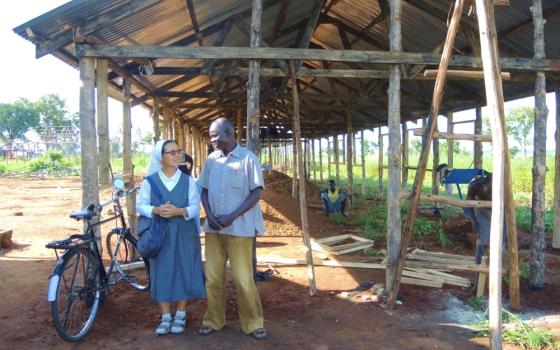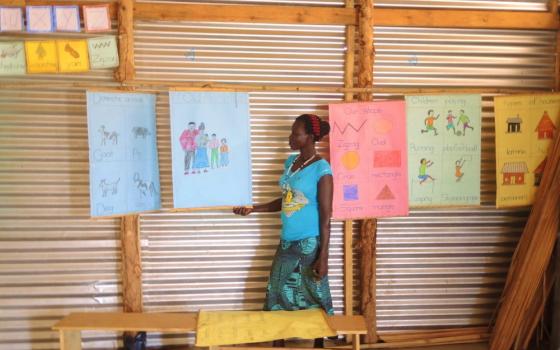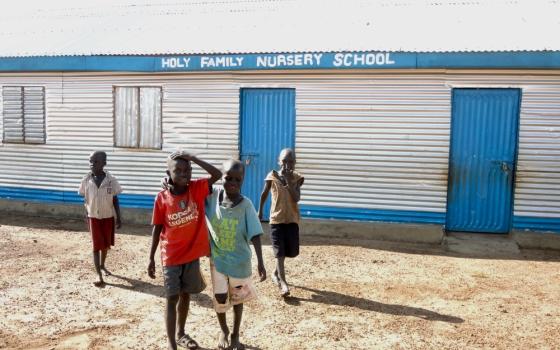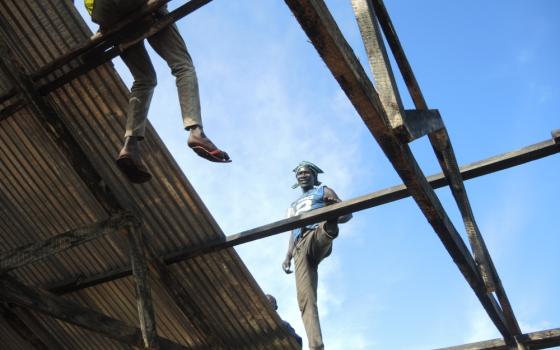Before she found herself uprooted, Sr. Cypriana Lyu and three other Charity Sisters of Jesus were just settling into their new mission in the village of Kerepi, South Sudan. They arrived in South Sudan in 2011, and after a few years of getting to know the community, they had just started building a secondary school for girls.
Although the civil war in South Sudan broke out in 2014, the villagers in Kerepi figured that because they were 100 miles south of the capital of Juba, they were too far away from the fighting to be in danger. For two years, this proved to be correct.
But over the summer of 2016 fighting broke out in their village, and dozens of people were killed. The sisters fled to Uganda along with almost their entire parish. Today, they continue to minister to the same people, who are now living in refugee settlements near Adjumani in northern Uganda.
Global Sisters Report went with Lyu as she was on her daily rounds of the refugee camp to oversee construction of community schools. The sisters are working to obtain education for the children in their community despite the uncertain situation in a Ugandan refugee camp.
GSR: Tell us about how you came to Uganda.
Lyu: The area of our mission [in South Sudan] is a rural area, and we never thought the fighting would reach there. But suddenly, there were shootings. They were killing people and shooting people. So many people were dying. People ran to our mission to stay with us. We thought after a few days, the fighting would be finished.
It was a terrible situation. But people were running away [to Uganda], one by one. That's when Fr. Sisto Ojja Ambayo decided if there are no people [in Kerepi], then you don't need a mission here. We have to go with the people. So we all ran away together.
What did you do when you got to Uganda?
The refugees went to a reception center when they got to Uganda for about a month or two. [United Nations reception centers, temporary camps located on the borders of Uganda, do the initial processing to determine which settlements can accept more refugees.] We sisters went to Nimele, a town on the border between South Sudan and Uganda. There is a mission and a parish already there. We stayed there for a month and a half. Then we came here to Adjumani to find our people.
In the beginning, they were all in the camp reception area, all cooking together and sleeping outside together. Then the U.N. made a list, and each family was distributed a plot of land [part of the Ugandan government's plan to get each family to cultivate their own food].
We thought we'd go back to South Sudan after one month, that there would be peace. But we've been here for over a year. We have no more patience. It's a very difficult life.
What is the community's biggest challenge in the camps?
The big issue is education. The older people, they don't have jobs, but they are still OK because they are already grown up. But the small ones, they need education. People won't have any of the knowledge that they need when they go back to South Sudan.
They are eager to give education to their children. But in the settlement, there is one school for 1,000 children. There are 200 students in each class. We are active in finding sponsorships for the children's education because people in the camp have no money because there is nowhere to work.
Some families have husbands or relatives who live abroad and send them money, so they are OK. Some of those families with money pay for transportation and send their children to Ugandan government or private schools in Adjumani [the nearest city]. But if they don't have money, they can't even pay the small school fees for the school in the camp. Even in the camp, you still need money for exercise books or uniforms or eating, but people in the camps have no money. Once a month, they receive food, and they sell it to get money. They don't have any other choice, so they have to sell their food.
What advice do you have for other sisters working in refugee camps around the world?
When I go back to South Korea, I'm always thinking about how I can share this experience with my sisters. But it's such a different situation from what they know. I keep it in my heart. I cannot give advice.
How do you keep your hope despite the difficult situation?
In the beginning, I thought that very quickly we would go back, and I'd continue working on my mission in Kerepi. Now already over a year has passed. Over the summer, I went back to our place. They took the iron sheets of the roof of our house. It's a terrible place now. No one is living there. But still we hope someday to go back. I feel very tired. Very tired. But when there is peace, we will go back.
[Melanie Lidman is Middle East and Africa correspondent for Global Sisters Report. She is based in Israel.]




